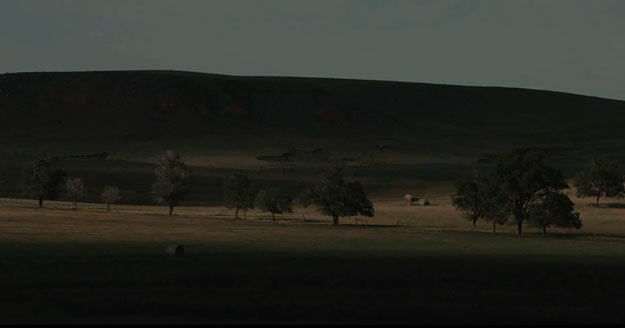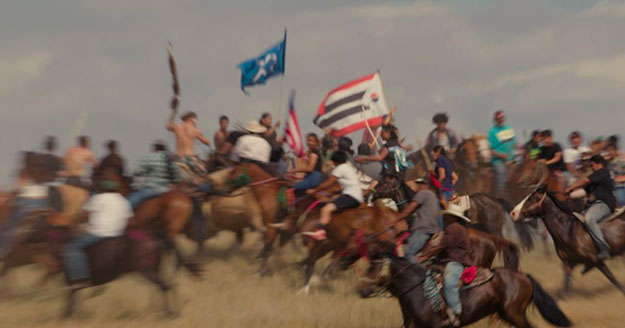
I missed this documentary during MSPIFF so when I got a chance to view a screener, I did not pass it up. I have to preface this by saying that I did not grow up in the United States, I came here for college so I realize I have a huge blindspot about Native American history and the dark times when the Indigenous people were chased off their lands and brutally slaughtered. This documentary chronicles the Lakota Indians’ quest to reclaim the Black Hills, their most sacred land that was stolen in violation of the Fort Laramie Treaty of 1868. I live in Twin Cities’ Dakota County, yet I have no idea what Dakota refers to other than the fact it’s a Native American word. Well, I have since learned that the Sioux Nation or Očéti Šakówiŋ refer to themselves as Lakota, Nakota, or Dakota, and the latter occupies a region east of the Mississippi which is where Minnesota is located.

Directed by Jesse Short Bull and Laura Tomaselli, and written & narrated by acclaimed writer and poet Layli Long Soldier, the film opens with a wide shot of the expansive Black Hills, accompanied by evocative music to show us the place that matters most to the Očéti Šakówiŋ communities. Though it’s indeed a stunning vista, it isn’t merely a pretty picture but a real, meaningful, life-giving place that since the arrival of the first Europeans in 1492 has been a site of conflict between those who have nurtured the land vs. the settlers seeking to exploit it. As an Indonesian-born immigrant, colonialism is something I’m very familiar with, given that my home country was colonized by the Dutch for 3.5 centuries. Long Soldier’s narration makes this an even more personal portrait of resistance as we reflect on her words and ponder what’s truly at stake in this generations-long fight to reclaim what’s rightfully theirs.

As a naturalized citizen, I think it’s important not to ignore America’s enormous debt to the Indigenous communities, and the film shows how there’s still a long way to go to repair the wrongs of the past. The filmmakers use a variety of methods at their disposal to show how the American media has shaped the often distorted narrative of the Indigenous people. From soundbites, headlines from artifacts dating back to the 1800s, and of course the movies, whether it’s cartoons or the quintessentially American genre, the Westerns.
The documentary also includes clips from relevant films, such as Steven Spielberg’s Lincoln starring Daniel Day-Lewis in the title role. I haven’t seen that film yet but apparently, it includes scenes of Lincoln signing the emancipation but NOT the part about how Lincoln actually ordered the hanging of Dakota 38 in Mankato, MN during The U.S.-Dakota War of 1862. To this day, that event remains the largest mass execution in US history.

Co-director Jesse Short Bull is a member of a member of the Oglala Lakota Tribe in South Dakota, this topic is definitely close to his heart. It definitely helps shape the film as something more than informative and educational, but an authentic and heartfelt portrait of righteous indignation against social injustice. Artistically, this is one of the most beautiful and well-crafted documentaries I’ve ever seen. It deftly blends archival footage, a few re-enactments, plus what you’d call ’talking heads’ or on-camera testimonies from various Lakota leaders and allies supporting their cause, including actor and activist Mark Ruffalo who’s one of the film’s executive producers.
There’s a scene where one of the Lakota leader’s grandkid show up in the middle of his interview taping and we see footage of him interacting with his family as his VO keeps on running. It’s such a touching moment that further humanizes the story and how this cause affects future generations of the Lakota people. Indigenous composer Raven Chacon nicely complements the film with his lively rhythmic score.
After seeing this, I certainly can’t look at those faces in Mount Rushmore the same way again. To say this film is thought-provoking is a giant understatement. Lakota Nation vs. United States is deeply provocative in the right ways, an elegant and potent testament to the powerful strength and dignity of those who have survived and endured so much.

* All images courtesy of IFC Films
Have you seen the Lakota Nation vs. United States documentary? I’d love to hear what you think!
…

Pingback: Lakota Nation vs. United States (2023) – FLIXCHATTER FILM BLOG – Motube
Pingback: Alliance Lately: Issue No. 79 – The Minnesota Film Critics Alliance
I got my hands on a screener of this as well that I’m hoping to watch today. Where I grew up in ND, there wasn’t many Lakota, but certainly plenty of others tribes. I’m always going to be pro-give the indigenous folk their land back. There’s a lot of ugly stigmas I’ve had to re-examine as I’ve aged.
Pingback: What I Watched in JULY 2023 + Mini Reviews + My Pick of Movie Of the Month – FLIXCHATTER FILM BLOG